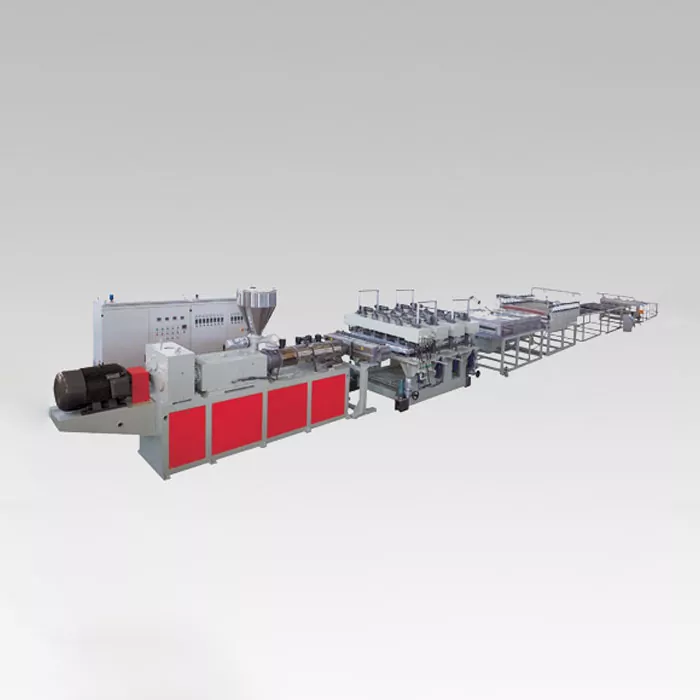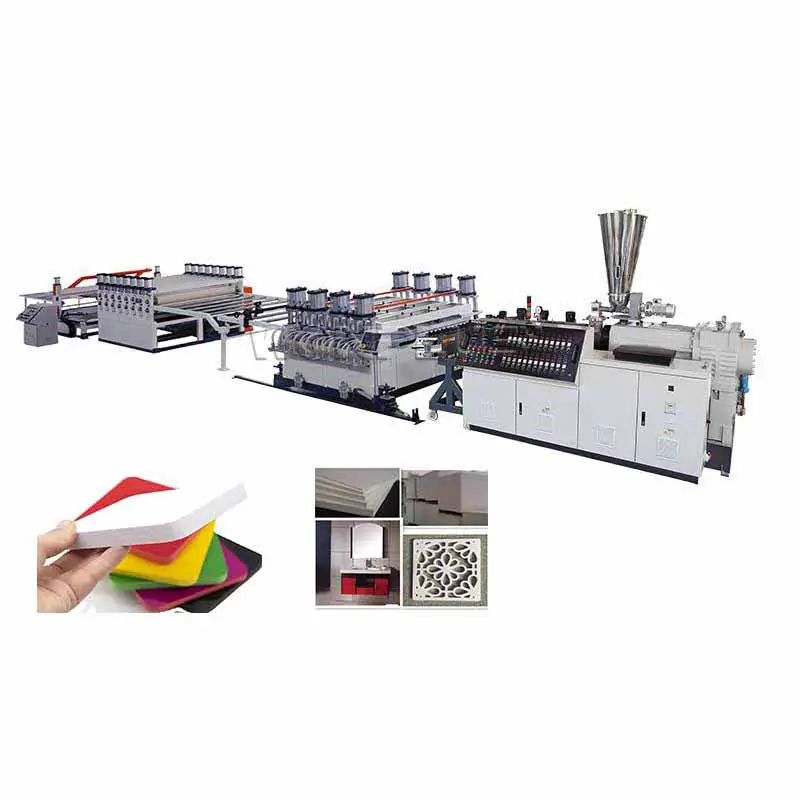How Does PVC Foam Board Production Line’s Closed-loop Recycling Achieve 98% Edge Trim Reuse in Furniture Panels?
The flying debris when cutting boards in the furniture factory used to be a headache for the workshop director, Lao Zhang. A 2.4-meter-long cabinet door panel, after being cut, will produce nearly 30 centimeters wide scraps. These PVC strips with rough edges are piled up in the corner, taking up space and being difficult to handle. It was not until last year that the factory where Lao Zhang worked introduced PRE-WORLD's PVC foam board production line. These "waste materials" suddenly became hot commodities - the closed-loop recycling system built into the production line could crush, purify and re-granulate the scraps, and then mix them with new materials to produce brand new boards. Nowadays, 98% of the 60 tons of scraps processed by this factory each month return to the production line, saving over 3 million yuan in raw material costs annually.
The comeback from "waste" to "raw materials"
The traditional way of dealing with scraps is like a "rough farewell" : workers use forklifts to load the crushed materials into trucks and transport them to the suburbs for landfill or sell them at low prices to recycling stations.
The closed-loop system of PRE-WORLD is like a "precise rebirth ceremony" : The long strips of waste generated by cutting are sucked into the pipe and first cut into 3-millimeter particles by a guilloine crusher - this size not only avoids entanglement with the equipment but also ensures uniformity during subsequent melting. Then, the particles enter the triple purification chamber, the cyclone separator acts like a "vacuum cleaner" to sweep away the dust, the magnetic separator precisely removes metal impurities such as screws mixed in, and finally the color sorter uses a high-speed camera to scan and sort out the yellow or discolored particles. The purified particles are automatically mixed with new raw materials in a ratio of 3:7, and then remelted by a twin-screw extruder. The extruded plates, after testing, have almost no difference in indicators such as bending strength and weather resistance compared to pure new material products.
The practice of a custom furniture factory in Shandong has confirmed the efficiency of this system. In the past, the factory produced 20 tons of by-products every month, with processing costs as high as 12,000 yuan. After the transformation of the PRE-WORLD production line, not only was this expense saved, but it also sold the re-granulated products to nearby small factories at a price of 2,800 yuan per ton, generating an additional income of 56,000 yuan per month. "Previously, workers found dealing with waste materials troublesome. Now, they are all scrambling to operate the recycling system - once the machine is turned on, the scraps turn into money." " The production supervisor of the factory said with a smile.

"Dual-track choice" of second-hand equipment and brand-new production lines
The renovation plan for second-hand PVC foam board equipment is mainly targeted at small and medium-sized manufacturers with limited budgets. PRE-WORLD acquires second-hand production lines that have been in service for less than three years from around the world, replaces core components such as screws and die heads, and installs a closed-loop recycling system. The price of the renovated equipment is only 60% of that of the brand-new equipment, but the recycling efficiency still reaches 98%. A board factory in Jakarta, Indonesia, recovered its equipment investment within six months after purchasing a renovated second-hand production line. Now, it supplies regranulation to 200 furniture workshops every month, setting a benchmark for turning waste into treasure in the local area.
The brand-new PVC foam board production line mainly targets the high-end market. This production line integrates IoT modules, which can monitor over 200 parameters in real time, such as the mixing ratio and extrusion temperature, and automatically adjust the process through AI algorithms. After the introduction of a certain European automotive interior supplier, the waste material reuse rate for the production of door interior panels increased from 85% to 98%, and the fluctuation value of the surface gloss of the panels dropped from ±5% to ±1.2%, directly passing the strict quality inspection of car manufacturers such as Mercedes-Benz and BMW.
We even renovated an old device from 2005. Chen, the technical director of PRE-WORLD, recalled, "The customer originally intended to scrap it. After we replaced it with a new type of screw and closed-loop module, the quality of the advertising boards it now produces is even better than that of some new equipment."

Cross-border inspiration for the recycling of metal stamping parts
In the R&D workshop of PRE-WORLD, engineers are extending the concept of closed-loop recycling to the field of metals. When car factories stamp car doors, a large amount of metal debris is produced. Currently, the industry uses magnetic separators for recycling, but the oxide layer and oil stains make the reuse rate less than 70%. Engineer Chen picked up a piece of steel plate scrap stained with oil and said, "If we can use ultrasonic cleaning to remove the oil stains like we do with PVC and then use laser to remove the oxide layer, perhaps the recycling rate of metal waste can exceed 95%."
This idea of "cross-material recycling" is not just empty talk. PRE-WORLD has reached a cooperation with a leading automotive parts manufacturer and plans to launch a prototype of a dedicated recycling motor for metal stamping parts by 2025. This equipment will integrate technologies such as high-pressure water jet cleaning and plasma decontamination, with the aim of increasing the recycling value of each ton of metal waste from the current 3,000 yuan to 8,000 yuan. "Imagine that in the workshops of future car factories, metal shavings are being 'exploited' like PVC scraps. That would be another green revolution in manufacturing." " Engineer Chen is full of anticipation.
"Zero waste" practices in the global market
At present, PRE-WORLD's closed-loop recycling technology has been applied to over 400 production lines worldwide, serving well-known enterprises such as Oppein Home Furnishing and Saint-Gobain. Its second-hand equipment renovation business has a market share of 35% in Southeast Asia and the Middle East, while its new production lines occupy 22% of the high-end market in Europe.
Our goal is not to sell equipment, but to help customers build "zero-waste factories". General Manager Li of PRE-WORLD stated, "Only when every PVC sheet and every metal stamping part can be recycled throughout their life cycle can the manufacturing industry truly break free from the 'resource curse'." " It is learned that the company is developing the third-generation closed-loop system, planning to mix recycled particles with bio-based materials to produce degradable and environmentally friendly PVC foam boards - this might be the next breakthrough point to change the industry.






